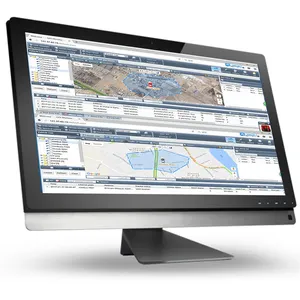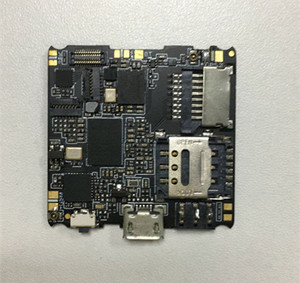(91 products available)



























































































































































































































A GPS tracker with open source code is a tracking device that receives GPS signals, allowing it to pinpoint its location anywhere on Earth. The device also has a public open-source software that allows users to customize it to suit their needs. There are several different types of GPS trackers with open-source code, including:
Asset GPS trackers
Asset GPS trackers are tracking devices mainly used to track valuable assets or property. In most cases, these valuable assets are trailers, shipping containers, or construction equipment that could be stolen or lost. The devices allow users to monitor the location of the asset in real-time. Users can also set up geofences and receive alerts whenever the asset moves beyond the set boundaries.
Vehicle GPS tracker
Vehicle GPS trackers are devices used to track the location of vehicles in real-time. This allows for better security and monitoring of the vehicles. Besides the real-time tracking, vehicle GPS trackers also offer features such as speed monitoring, route history, and geofencing. This makes the device popular among fleet managers who use it to track the location and behavior of their drivers and, in general, the fleet of vehicles.
Personal GPS tracker
Personal GPS trackers are portable devices that are carried by individuals to track their location in real-time. This allows for tracking of the individuals by friends, family, or even emergency services in case of an emergency. The devices are especially popular among children and the elderly with memory problems. Besides the tracking, personal GPS trackers have an SOS button that can be pressed during an emergency to alert the concerned party.
Pet GPS tracker
Pet GPS trackers are devices that are attached to a pet's collar to allow tracking of the pet's location in real-time. This allows the owner to track the pet and monitor its activities. This is especially important for pets that are prone to wandering. The devices often have features such as geofencing and alerts when the pet leaves the set area.
Bike GPS tracker
Bike GPS trackers are devices installed in a bike to allow for real-time tracking of the bike. This allows for better security of the bike and also allows for tracking in case of theft. Bike GPS trackers can also be used for fitness tracking by monitoring the location and speed of the bike during a ride.
Mobile GPS tracker
Mobile GPS trackers are tracking devices that use the existing GPS capabilities in mobile phones to track the location of the phone in real-time. In most cases, mobile GPS trackers are used to track the location of the phone in case of loss or theft. Users can also monitor the location of the phone in case of an emergency. Additionally, mobile GPS trackers allow for tracking of the user's location, which can be used for various applications such as fitness tracking or location-based services.
The following are specifications to be aware of when sourcing for a GPS tracker with open source code:
Operating System
The firmware of GPS trackers with open source code is available for Android, Linux, and Windows. Users can customize their applications based on the type of operating system.
Network Compatibility
Compatibility with 2G, 3G, 4G, and even 5G networks ensures that the GPS tracker can communicate data across various mobile networks. This is important for maintaining connectivity and tracking accuracy.
Battery Life
Long battery life is crucial for trackers to function optimally. A good tracker has an average battery life of up to 2 weeks in tracking mode. Battery capacity is measured in milliamp hours (mAh).
Size and Weight
Depending on the purpose of tracking, customers will require trackers that are small and lightweight or those that are large and visible. For instance, in pet tracking, small and lightweight GPS trackers are ideal.
Open Source Community
This is a group of users and developers that maintain and support the software. A large and active community offers continuous development, improvement, and bug fixes to the software. Users can also access documentation, forums, and support.
Wholesalers of trackers should be aware of the following maintenance aspects of the GPS tracker with open source code:
There are several factors to consider when choosing a GPS tracker with open source code for business needs:
Determine the Purpose:
The first step is to determine what the GPS tracker will be used for. This could be tracking vehicles, monitoring equipment, or even personal tracking. Different purposes may require different features.
Check Battery Life:
For devices with battery life that can last for days or weeks, consider how long the tracker can last. If the tracker needs to be charged frequently, it won't be useful in many situations.
Consider the Size and Design:
The size and design of the GPS tracker are also important. If tracking a person or pet, a small and discreet tracker is needed. For vehicle tracking, the size may be less critical, but the design should allow for easy installation.
Data Security:
With open-source GPS trackers, there is a risk of data being accessed by others. Look for trackers that have strong encryption to keep the data safe and private.
Community Support:
Open source GPS trackers rely on community support. A strong and active community can help with any problems or questions that arise. Check if the tracker has an active community for reliable support.
Evaluate the User Interface:
The user interface of the tracking software is crucial. It should be intuitive and easy to navigate. Spend some time testing the interface to ensure it meets the needs and is user-friendly.
Consider Future Scalability:
When selecting a GPS tracker for business, consider the possibility of growth. Will the business need to track more devices in the future? Choose a tracker that can easily scale to accommodate additional devices without complications.
Assess the Data Accessibility:
Check how easily the tracked data can be accessed. It should be simple to view and analyze the data using a computer or mobile device. Make sure the tracker provides convenient data access for effective tracking.
Here are the steps on how to DIY and replace GPS Tracker with open source code:
Choose a GPS Tracker
Select a GPS tracker with open source code that meets the required needs. Consider factors such as battery life, size, and tracking capabilities. For instance, one can use Traccar, an open source GPS tracking platform that supports various GPS trackers.
Set up the device
Follow the instructions provided by the manufacturer to set up the new GPS tracker. This usually involves charging the device, turning it on, and connecting it to a Wi-Fi network or a mobile network.
Configure the software
Configure the software on the new device to match the old device's settings. This may include setting up tracking intervals, configuring alerts, and setting up the tracking device's user permissions.
Test the new device
After replacing the GPS tracker with open source code, ensure everything is working properly before beginning. Check the tracking data on the web interface or mobile app to ensure it is accurate and the same as the old device. Run a test drive to ensure the new tracker works properly.
Q1: Can a non-developer set up an open-source GPS tracker?
A1: Yes, but with user-friendly options. While many require some technical know-how, there are user-friendly, no-code-based options available. These allow for setup and customization without extensive programming skills.
Q2: Are open-source GPS trackers as reliable as commercial ones?
A2: Open-source GPS trackers can be highly reliable, but their reliability depends on the specific software, the hardware used, and the configuration. The tracked information might be less reliable in some cases if it's not configured correctly.
Q3: Can I customize an open-source GPS tracker for specific needs?
A3: Yes, one of the main advantages of open-source GPS trackers is the ability to customize them according to specific requirements. Users can modify the code, add features, or remove unnecessary components to suit their needs.
Q4: Are there any community support options available for open-source GPS trackers?
A4: Yes, many open-source projects have associated communities that provide support. Users can seek help, report issues, or contribute to the development through forums, mailing lists, or GitHub repositories.
Q5: Is it possible to integrate open-source GPS trackers with other systems?
A5: Yes, open-source GPS trackers can often integrate with other systems through APIs or existing plugins. This allows for data exchange and coordination with other applications or services, enhancing overall functionality.